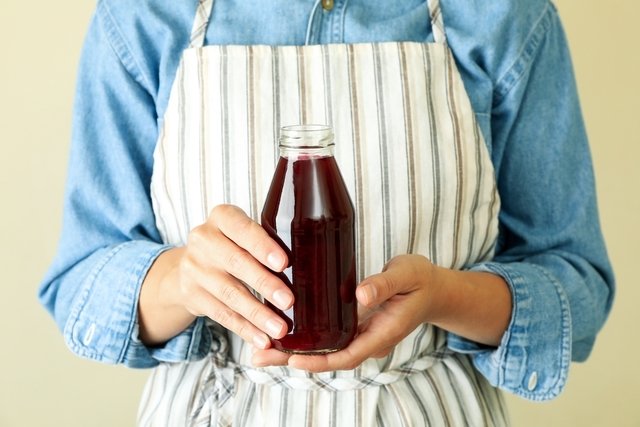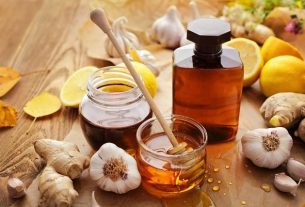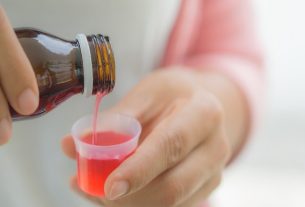Beetroot syrup is a natural syrup that can be made from raw beetroot and is widely used to help treat coughs, high blood pressure or anemia, as it contains betalains, nitrates, phenolic compounds, carotenoids and acid. ascorbic acid, as well as iron and vitamin C, with anti-inflammatory and antioxidant properties, which help reduce inflammation, promote relaxation of blood vessels and improve the functioning of the immune system.
This syrup is simple to prepare and can be made at home using just beetroot or adding ginger, honey or cinnamon to improve its properties.
Beetroot syrup should not be used by diabetics because it can increase the amount of sugar in the blood. Furthermore, this syrup does not replace medical treatment and, therefore, it is important to always consult a doctor to carry out the most appropriate treatment for each case.
What is it for
Beetroot syrup has anti-inflammatory, antioxidant, anti-anemic and anti-hypertensive properties, and therefore can be used to help treat various situations, such as:
- Cough, asthma or bronchitisas it helps reduce inflammation of the airways;
- Flu and coldsas it contains vitamin C that helps improve the functioning of the immune system;
- High pressureas it contains nitrates that help relax blood vessels and improve blood circulation;
- Anemiaas it contains iron and B vitamins and vitamin C;
- Decreased mental function and reasoningby promoting the dilation of blood vessels, increasing blood flow to the brain.
Beetroot syrup can also be used to help improve the performance of athletes, as it is rich in nitrates, potassium and calcium, which help improve muscle oxygenation and maintain the health of muscle fibers.
Furthermore, some studies carried out in the laboratory with rats or using breast, prostate, esophageal and liver cancer cells show that beet betalains can help reduce damage caused to cells by free radicals and thus reduce cell proliferation. of these types of cancer. However, studies in humans are still needed to prove this benefit.
How to make
Beetroot syrup is simple and easy to prepare and can be made by adding ginger or cinnamon, for example.
1. Beet Simple Syrup
This syrup must be prepared with raw beetroot, and can be used to help treat coughs, anemia or high blood pressure.
Ingredients
- 1 raw beet;
- 2 tablespoons of sugar.
Preparation mode
Wash and cut the beetroot into thin slices and place in a clean, dry glass container. Add the sugar and mix. Let it rest for 24 hours and after that time collect the liquid part that formed, which is the syrup. It is recommended to take 2 tablespoons of beetroot syrup, 3 times a day. For children, it is recommended to take half this dose.
2. Beetroot syrup with honey
Beetroot syrup with honey can be used to help treat flu, colds and coughs, due to its anti-inflammatory properties of the respiratory tract and helping to improve the immune system. Additionally, honey also helps lubricate the throat and reduce inflammation, relieving coughs.
This syrup should not be used by people allergic to honey, propolis or pollen.
Ingredients
- 1 raw beet;
- 2 tablespoons of honey.
Preparation mode
Wash and cut the beetroot into thin slices and place in a clean, dry glass container. Add honey, mix and let rest for 24 hours. After this time, collect the liquid part that formed, which is the syrup, and transfer it to another sterilized glass container and cover it. You can take 1 tablespoon 3 times a day until symptoms disappear. Children over 1 year old can take 1 teaspoon of beetroot syrup up to 3 times a day.
3. Ginger Beetroot Syrup
A good option for making beetroot syrup is to add ginger and cinnamon as they have anti-inflammatory, analgesic and natural expectorant effects, which help combat the symptoms of coughs, flu and colds.
Ginger should not be consumed by people using anticoagulant medications, as it has anticoagulant properties that can cause or increase the risk of bleeding and hemorrhage, and therefore should be removed from the syrup in these cases.
Ingredients
- 1 raw beet;
- 1 cinnamon stick or 1 teaspoon of ground cinnamon;
- 1 cup of sliced peeled ginger root;
- 85 g of sugar;
- 100 mL of water.
Preparation mode
Boil the water with the sugar, stirring until the sugar is completely dissolved. Turn off the heat, add the beetroot, ginger and cinnamon, and stir. Store the syrup in a clean, dry glass bottle. Take 1 teaspoon of beetroot and ginger syrup 3 times a day.
Who shouldn’t use
Beetroot syrup should not be used by people with diabetes, as it contains sugar or honey in its preparation, it can increase the amount of sugar in the blood and make it difficult to control blood sugar levels.
Furthermore, beetroot syrup made with honey should not be used by pregnant women or children under 1 year of age.
Bibliography
- OLSSON, H.; et al. Physiological Effects of Beetroot in Athletes and Patients. Cureus. 1112; e6355, 2019
- CLIFFORD, Tom; et al. The Potential Benefits of Red Beetroot Supplementation in Health and Disease. Nutrients. 7. 4; 2801–2822, 2015
- LECHNER, J. F.; STONER, G. D. Red Beetroot and Betalains as Cancer Chemopreventative Agents. Molecules. 24. 8; 1602, 2019
- KAPADIA, GJ; et al. Chemoprevention of DMBA-induced UV-B promoted, NOR-1-induced TPA promoted skin carcinogenesis, and DEN-induced phenobarbital promoted liver tumors in mice by extract of beetroot. Pharmacol Res. 47. 2; 141-8, 2003
- LECHNER, John F.; et al. Drinking Water with Red Beetroot Food Color Antagonizes Esophageal Carcinogenesis in N-Nitrosomethylbenzylamine-Treated Rats. J Med Food. 13. 3; 733–739, 2010
- HADIPOUR, E.; et al. Biological effects of red beetroot and betalains: A review. Phytother Res. 34. 8; 1847-1867, 2020
- KAPADIA, GJ; et al. Cytotoxic effect of the red beetroot (Beta vulgaris L.) extract compared to doxorubicin (Adriamycin) in the human prostate (PC-3) and breast (MCF-7) cancer cell lines. Anticancer Agents Med Chem. 11. 3; 280-4, 2011

Sign up for our newsletter and stay up to date with exclusive news
that can transform your routine!
Warning: Undefined array key "title" in /home/storelat/public_html/wp-content/plugins/link-whisper-premium/templates/frontend/related-posts.php on line 12
Warning: Undefined array key "title_tag" in /home/storelat/public_html/wp-content/plugins/link-whisper-premium/templates/frontend/related-posts.php on line 13




